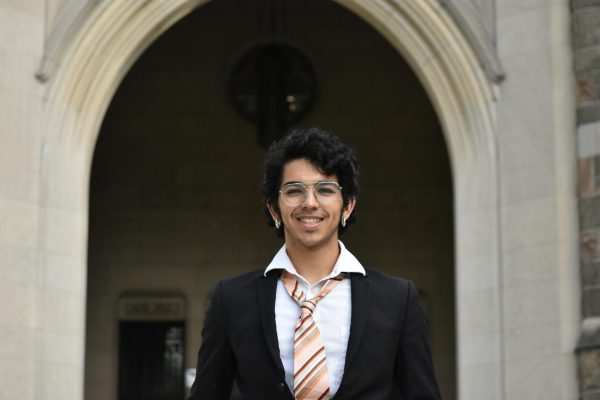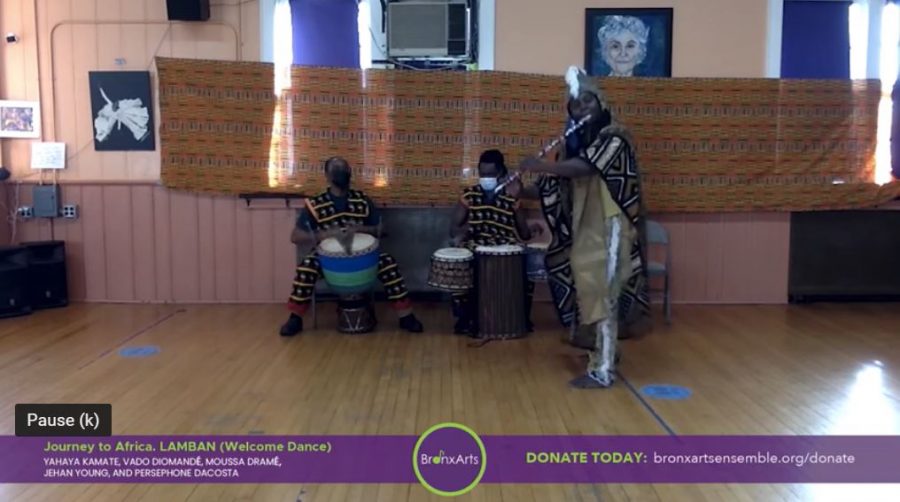The Bronx Arts Ensemble Celebrates Black History Month
Yahaya Kamata plays the flute as Vado Diomande & Moussa Drame play the drums. (Courtesy of the Bronx Arts Ensemble)
On the afternoon of Feb. 11, the Bronx Arts Ensemble presented a livestream hosted by performance artist Yahaya Kamate celebrating Black History Month. The event was composed of seven performances, including dances, drumming and vocal oration.
The livestream started with a reading of a passage from African American poet Countee Cullen’s 1922 poem “Heritage.” The opening lines of the poem posed the central question that each performance would answer: “What is Africa to Me?”
The poem transitioned into the second performance from the livestream, titled “Journey to Africa.” This dance featured two drummers, Vado Diomandé and Moussa Dramé, while the event’s host, Kamate, joined Diomandé and Dramé on drums. As the dance continued, Kamate also began to play the flute. He was joined on stage by two more female dancers, Persephone Dacosta and Jehan Young.
In the third dance- and drum-based performance, titled “The Voice of Our Ancestors,” Kamate explained how the dances and songs celebrate Black History. “This is a form of communication, a form of gathering,” said Kamate. “The drumming and dancing invoke an ancestral culture. This ancestral culture itself provides an excellent way to communicate. It’s a nonverbal, non-textual art that makes it easy to share with other cultures. Communication is key, and a part of celebrating Black History is in sharing its ideas, values and art.”
The fourth performance — a speech titled “Celebrating Black History Month” by Candace Hundley — expanded on this idea of shareable culture. As the title states, the speech discussed the historical and cultural significance of celebrating and learning about Black History Month.
Hundley emphasized the importance of members of African cultures uprooted to America coming to see themselves as “wealthy patron[s]” of American culture. “We celebrate our ancestors, those in the community who have passed on here but have roots in Africa and to acknowledge those ancestors in celebration,” said Hundley.
In the speech, Hundley explained the historical significance of traditional drumming, an art that was featured in a majority of the program’s performances. Specifically, drumming was used to represent the growth that African American culture has had over the course of American history.
Drumming was banned during the age of slavery for the role it played in allowing African Americans to collectivize in uprising and resisting. The prohibition of drumming not only made it harder for African slaves to communicate with each other but further removed slaves from the roots and traditions of their culture, according to Hundley.
As drumming was welcomed back post-slavery, African Americans used it to reconnect with their own history. Today, it is used to show the journey of struggles and hardships that African Americans have been subjected to. “An instrument of life, it’s a heartbeat, it’s our culture, it’s how we all come together using the same rhythm, the same patterns, to guide us into the future,” said Hundley.
After the speech, the event closed out with three more performances: “The Beauty of Women,” “A Celebration of Being Strong” and “Celebration of Fishing,” all speaking to different multicultural traditions.
“Words matter, lives matter and if we speak those words, we can bring back the African history we can be so proud of,” Hundley said.

Sebastian Diaz is a senior from Chapel Hill, N. C. who is double majoring in journalism and film. After starting as a news reporter for The Fordham Ram...










































































































































































































